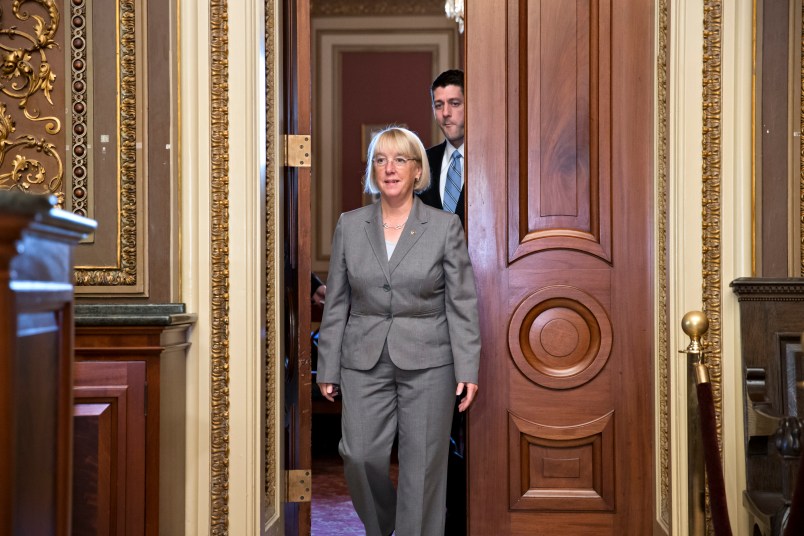House Budget Chair Paul Ryan (R-WI) and Senate Budget Chair Patty Murray (D-WA) are close to finalizing a modest but important budget agreement, and hope to announce it early this week after negotiating through the weekend.
The mini-bargain, if reached, would set spending levels for the next few years at roughly $1 trillion while mitigating the blunt damage caused by the sequester, according to sources familiar with the discussions. The across-the-board budget cuts would be replaced with a mix of flexibility for government agencies, targeted spending cuts and new non-tax revenues from higher government fees and asset sales.
Even if Ryan and Murray shake hands on a deal, which is not certain yet, there remain important obstacles to passing such an agreement through Congress and fleshing out appropriations bills by the Jan. 15 deadline to avert another government shutdown.
Here are the five most dangerous land mines that could blow up such an agreement.
1. House Conservatives
Conservative House Republicans are urging their leaders not to let the government spend a penny more than the $967 billion ordered by the sequester in 2014. A letter by at least 18 GOP signatories calls on Speaker John Boehner (R-OH) and Majority Leader Eric Cantor (R-VA) to bring up legislation that maintains that dollar amount.
If they prevail, the budget deal may go nowhere in the House. It’s possible that these conservatives are simply posturing to tilt the deal more in their favor. It’s not clear they’ll undercut Ryan as well as the GOP defense hawks and appropriators who strongly support such a deal. But they’re not known for falling in line and they tend to have their way in the House. If a deal crosses any of their red lines, they could potentially talk Boehner out of bringing it up by raising hell and threatening to topple him as Speaker.
Relatedly, outside conservative activist groups like Heritage Action and Club For Growth wield significant influence in the House. If these groups come out against a deal, it could lead to a domino effect of Republicans opposing it and GOP leaders responding by scuttling it.
2. Mitch McConnell
The Senate Republican leader made clear last month he does not want to raise spending above sequester levels. “It’s the law of the land,” he said. “I hope [the budget conference negotiators] will comply with the law.” Republicans ultimately see the sequester as their crowning achievement in the Obama era and won’t easily give it up.
But McConnell isn’t slamming the door shut on the Ryan-Murray framework just yet. “I think we’ll have to wait and see what they come up with,” said Don Stewart, a spokesman for McConnell. “His preference, of course, is to keep Washington spending reductions.”
The deal would likely leave deficit reduction unchanged, while raising spending. If McConnell’s goal is the former, then there’s some wiggle room for him. His re-election bid could play a role as he is fending off a conservative challenger, Matt Bevin, next May.
3. House Democrats
House Democrats feel shut out of the emerging deal. They believe it’s lopsided and ignores their priorities, chief among them to extend emergency unemployment insurance, which is set to expire for some 1.3 million Americans on Dec. 28. It costs $26 billion to extend for a year.
A senior Senate Democratic aide close to the Ryan-Murray negotiations conceded that unemployment benefits aren’t likely to be extended in the deal, but can be dealt with separately. “It’s meeting with resistance and looking less likely,” the aide told TPM.
The problem with that is House Republican leaders are signaling that they want to end the emergency benefits once they expire. If they stick by that hard line, Democrats may see the budget agreement as their most realistic vehicle to extend unemployment compensation.
4. Powerful Maryland Democrats
In addition, the budget deal may cut retirement benefits for federal workers, which has upset two powerful House Democrats who represent Washington-area districts in Maryland with many government workers. House Minority Whip Steny Hoyer and Budget Committee Ranking Member Chris Van Hollen are troubled by the possibility of pension cuts and, if they’re too high, they may oppose the agreement, sources familiar with their thinking say.
Obama’s 2014 budget effectively cuts federal retirement benefits by $20 billion over 10 years. Ryan’s 2014 budget cuts them by $132 billion.
Sen. Ben Cardin (D-MD) also sent a letter last Friday to Senate Majority Leader Harry Reid (D-NV) making his objections to pension cuts loud and clear. “I must tell you, in all candor that I am outraged by reports that one option being considered in the Budget Conference Committee is to increase the payroll contribution federal workers make to their defined benefit pensions,” he wrote. “No other group of predominantly middle class Americans has contributed to deficit reduction the way federal workers have.”
5. Time
The self-imposed deadline for a budget conference deal is this Friday, Dec. 13. But House Republicans are scheduled to adjourn for the rest of the year that day. So in order to avoid blowing up members’ plans, and maximize their chances of success, Ryan and Murray will have to announce a deal soon and fast-track it through the House.
If the proposal isn’t muscled through quickly, it gives conservatives more time to organize against it and protect the low sequester spending levels. Conservatives could conceivably turn against the deal if they feel the center of gravity among the base is shifting.
Then there’s the daunting task of fleshing out 12 appropriations bills in a way that both chambers can agree on. This has to happen by Jan. 15, when funding runs out, or the federal government is poised to shut down again.






